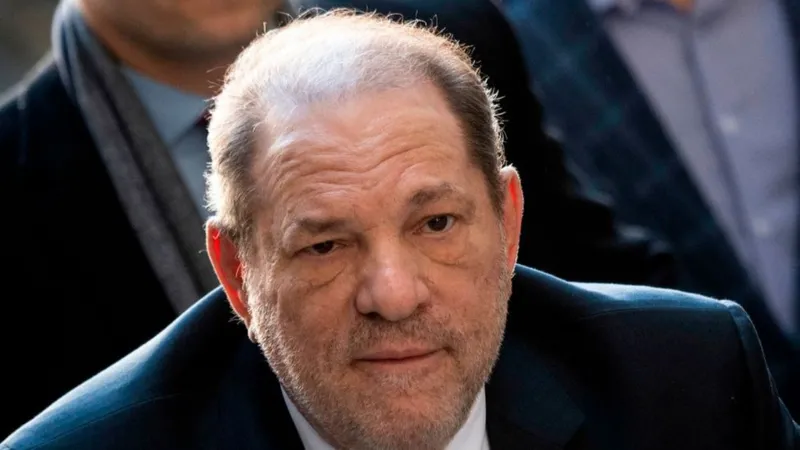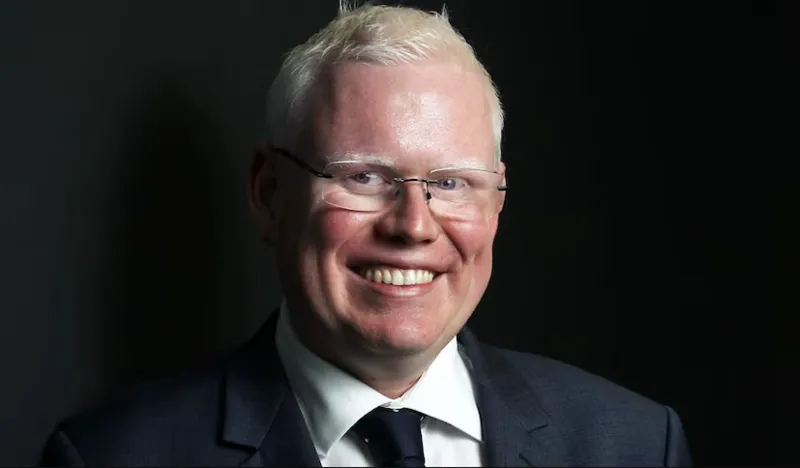Harvey Weinstein: Ashley Judd leads backlash against quashed rape conviction
Hollywood actress Ashley Judd says the overturning of disgraced movie mogul Harvey Weinstein's 2020 rape conviction is a "hard day for survivors".

"But we live in our truth," Ms Judd told BBC News in an interview.
The case against Weinstein was a landmark moment in the #MeToo movement.
The New York Court of Appeals ordered a new trial, saying the original had been prejudiced by witnesses with claims unrelated to the charges at hand. Weinstein has maintained his innocence.
The 72-year-old remains in prison. He was separately convicted of rape in Los Angeles.
The overturning of the New York conviction was criticised by complainants, lawyers and #MeToo activists as a setback for abuse survivors.
Ms Judd, the first actress to come forward with claims against Weinstein, said her day had been disrupted upon hearing that a new trial had been ordered.
The actress - who starred in films including Ruby in Paradise, Heat, and Norma Jean & Marilyn, and is part of the Silence Breakers group - added that the court's decision was a betrayal for sexual assault survivors.
"Oftentimes survivors say that the betrayal and the moral injury we suffer within the system is worse than the sexual body invasion we experienced in the first place," Ms Judd said.
She also commended those who had come forward in the New York case against Weinstein.
"We know what happened and the truth is consistent," she said.
The New York Appeals Court reached a four-three ruling, stating that Weinstein's 2020 trial had "erroneously admitted testimony of uncharged, alleged prior sexual acts against persons other than the complainants of the underlying crimes".
It also said the trial judge had allowed Weinstein to be cross-examined in a way that portrayed him in a "highly prejudicial" light. "The remedy for these egregious errors is a new trial," it added.
At his trial in 2020, Weinstein was convicted of sexually assaulting former production assistant Mimi Haleyi in 2006 and raping Jessica Mann, a former aspiring actress, in 2013. He was jailed for 23 years.
Weinstein's defence team said sex between the movie executive and the accusers had been consensual.
Weinstein was sentenced in California last year to 16 years for raping an Italian model and actress in a Beverly Hills hotel in 2013.
The later conviction is not affected by the appeal in New York. He will remain in Mohawk Correctional Facility in New York state while the Manhattan district attorney considers launching a new trial.
Complainants, lawyers and campaigners described Thursday's ruling as "tragic" and a "leap backwards" for the rights of victims of sexual abuse by powerful men.
Gloria Allred, a lawyer who represented Mimi Haley, the key prosecution witness in the New York case, said her client would consider testifying again "even though the process of testifying was gruelling and retraumatising for Mimi".
"I commend Mimi on her courage and willingness to keep standing up for the truth," she said, adding that "although victims have lost this battle they have not lost the war. We will continue to fight for justice".
The Silence Breakers earlier said its members would not be bowed by a decision they regarded as "profoundly unjust".
At a news conference in New York, members including Ms Judd said that they would continue to seek justice for victims of sexual abuse and violence.
Katherine Kendall, who alleged Weinstein had chased her around a hotel room nude, said the decision was a "terrible reminder that victims of sexual assault just don't get justice". "I'm completely let down by the justice system right now," she added.
Tomi-Ann Roberts, a professor of psychology at Colorado College who alleges she was sexually harassed in 1984 by Weinstein, said she hoped the quashing of his conviction "re-energises the #MeToo movement".
She added that sexual assault victims "who go up against powerful men rarely get justice. But the important thing is that we do not stop speaking out".
Douglas Wigdor, a lawyer who represented eight of Weinstein's accusers, said the appeal court's decision was "a major step back in holding those accountable for acts of sexual violence".
"Courts routinely admit evidence of other uncharged acts... the jury was instructed on the relevance of this testimony," he added. "It will require the victims to endure yet another trial."
Lindsay Goldbrum, who represented six Weinstein victims, said the appeal court's criticism of the use of witnesses not directly connected to the charges was a "leap backwards" and damaging to future cases.
She said that the witnesses had "nothing to gain personally from participating in the trial. Their only goal was to give a voice to dozens of other women who suffered so much".
Madeline Singas, one of the dissenting judges in the appeal ruling, said that with the decision, "this court continues to thwart the steady gains survivors of sexual violence have fought for in our criminal justice system".
Weinstein's lawyer, Arthur Aidala, however hailed the reversal as a win for the legal system.
"From the bottom of our hearts, from our collective hundreds of years of experience, we knew that Harvey Weinstein did not get a fair trial," he said at a new conference in New York.
"There are still people who are very unpopular in our society, but we still have to apply the law fairly to them. The law was not applied fairly to Harvey Weinstein."
He said his client was ready for a new trial - where he would be able to tell his side of the story.
Before the allegations against him emerged, the producer and his brother Bob were among Hollywood's ultimate power players.
They co-founded Miramax Films, a distribution company named after their mother Miriam and father Max, in 1979. It was sold to Disney in 1993.
Their hits included 1998's Shakespeare in Love, for which Weinstein shared a best picture Oscar. Over the years, Weinstein's films received more than 300 Oscar nominations and 81 statuettes.
-bbc







